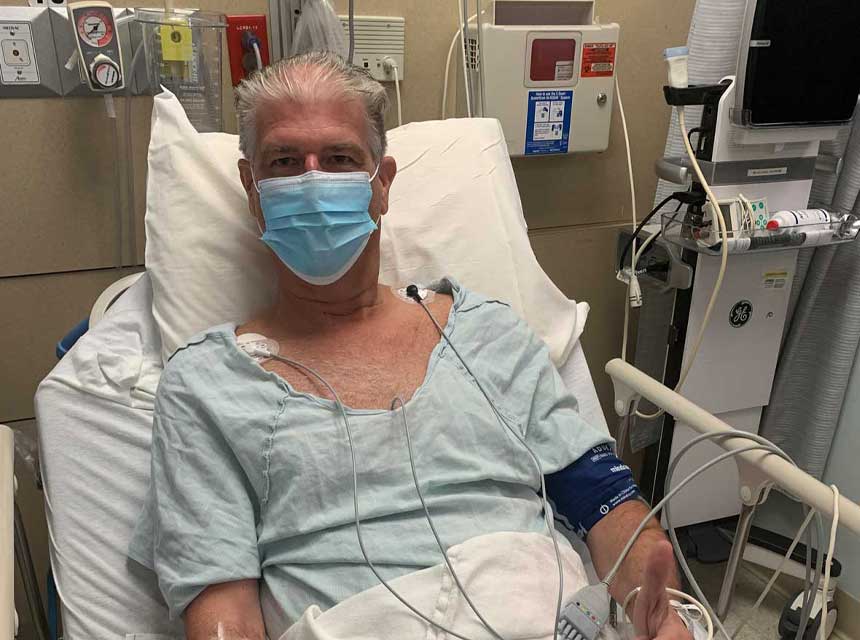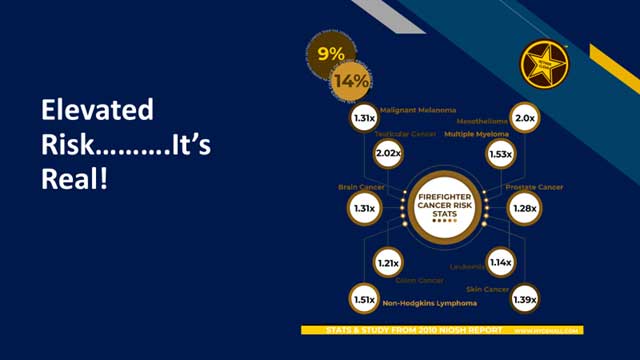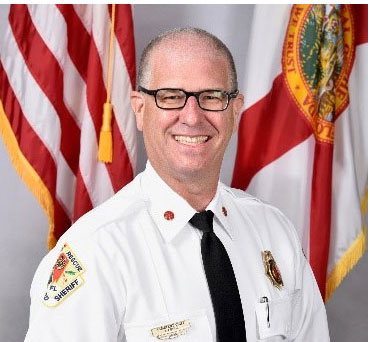
By Todd LeDuc
I had my first diagnostic colonoscopy in my early forties and was relieved to find that it was completely normal. Of course, like most people I had apprehension and it wasn’t something I relished the thought of doing, but I kept in mind research conducted by the National Institute of Occupational Safety & Health (NIOSH) that firefighters have a nine-percent elevated overall risk of cancer and 14-percent higher mortality rate than general population. Specifically, with regards to colon cancer, firefighters have a 1.21-times higher rate the NIOSH study reported (Figure 1).

A decade later, I just completed my second colonoscopy and had two polyps removed, one 4 cm and another 2 cm. Both were biopsied; one was “pre-cancerous” and one was “benign.” The takeaway is that screening and imaging saved me from becoming a statistic of colon cancer. Had I not had the procedure and the imaging and ultimately the removal, the “pre-cancerous” polyp would likely grown and cancer cells continue to manifest.
Recent recommendations from the U.S. Preventative Health Task Force (USPHTF) had now lowered the initial recommended age from 50 to 45 for members of the general population. It is important for us to understand that the USPHTF makes primary care recommendations for members of the general population and these are not intended to address heightened occupational health risks that firefighters face, such as cardiovascular events and cancer. According to the American Cancer Society (ACS), in 2020 12 percent of colorectal cancer will be diagnosed in people under the age of 50. Additionally, according to the ACS, rates have been increasing since the mid-1980s in adults ages 20-39 and since the mid-1990s in adults ages 40-54 years, with younger age groups experiencing the steepest increase.
ALSO
Metabolic Syndrome in the Fire Service: Cardiac Disaster Soup!
Sudden Cardiovascular Death and Disability in Firefighters: A Complex Interplay
Surviving the Fire Service Cardiac Epidemic
However, screening rates do not reflect adherence to screenings in accordance with USPHTF recommendations. Surprisingly, the ACS reported in 2018 only 66 percent of people over age 50 were up to date with colorectal cancer screening. However, among those 50-54, it was less than 50 percent. These statistics are frightening given the potential consequences, which are steep. In fact, sobering to learn that five-year colon cancer survival rates go from 91 percent if found early at the primary site or even pre-cancerous and then craters to a mere 11 percent if has already spread. (Honer et al, 2009). Of course, the elevated occupational risk of firefighting underscores the importance for early utilization of screenings to identify health risk and disease processes early allowing for the best outcomes possible.
Enhanced screening recommendations have also emerged for firefighters on the cardiovascular front. We know from NIOSH firefighter fatality findings and the work of Denise Smith, PhD. that nearly 80 percent of sudden cardiac death in firefighters have both left ventricular hypertrophy and underlying cardiac disease. The “BETTER HEART” study recommends cardiac ultrasound/echo and baseline calcification scoring be used for screening in firefighter population.
Firefighters and first responders have unique occupational health risk that are elevated beyond other occupations and general population. This elevated risk underscores the need for enhanced, early health screenings as well as annual comprehensive annual medical exams.

Todd J. LeDuc, MS, CFO, FIFirE, retired after nearly 30 years as assistant fire chief of Broward County, Florida, an internationally accredited career metro department. He served as chief strategy officer for Life Scan Wellness Centers, a national provider of comprehensive physicals and early detection exams. He has served as a member of the International Association of Fire Chief’s Safety, Health & Survival Section for over a decade and is currently secretary of the section. He is a peer reviewer for both professional credentialing and agency accreditation. He is editor of Surviving the Fire Service (Fire Engineering Books) and serves on numerous advisory boards and publications. He can be contacted at Todd. LeDuc@lifescanwellness.com

